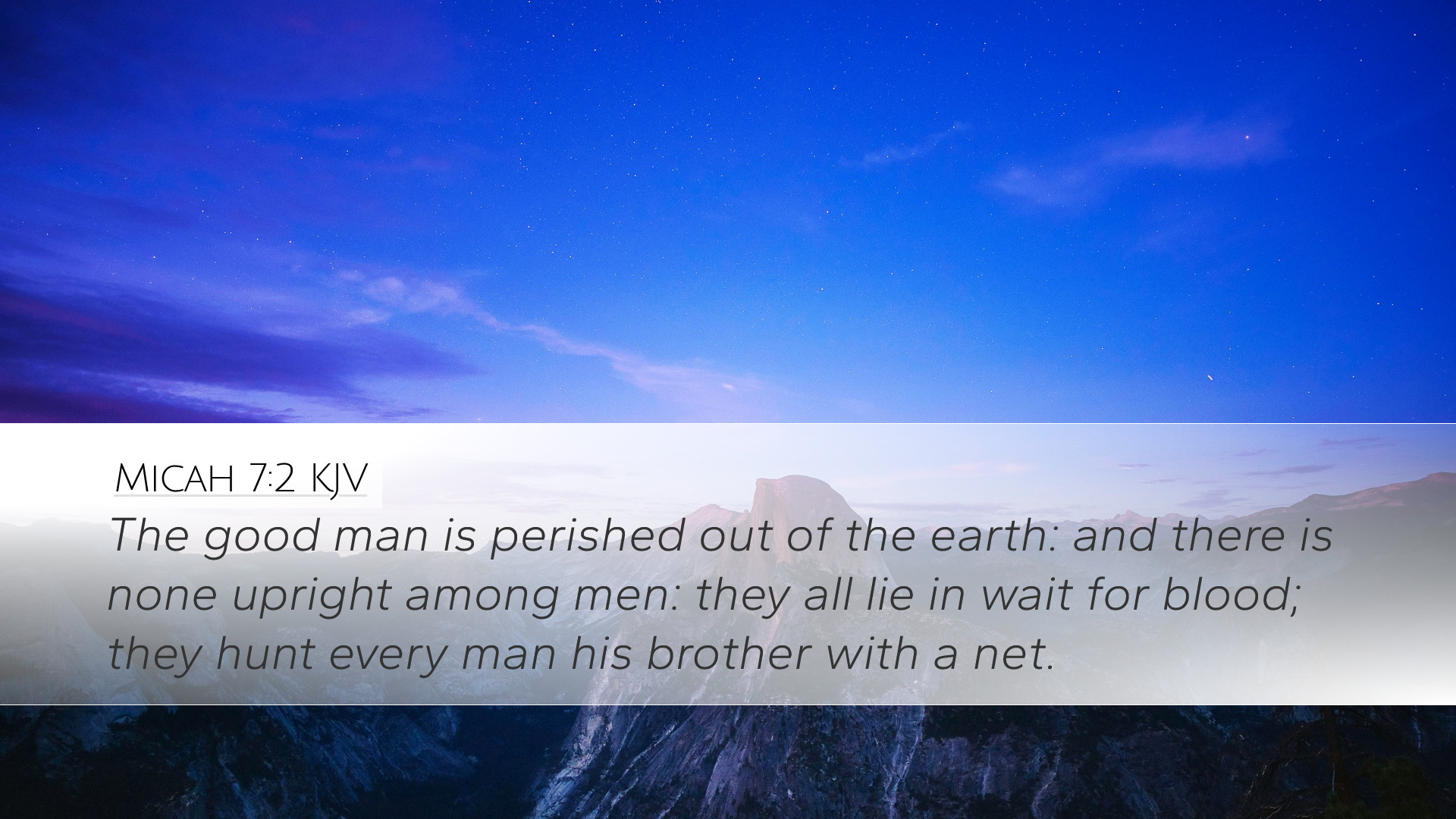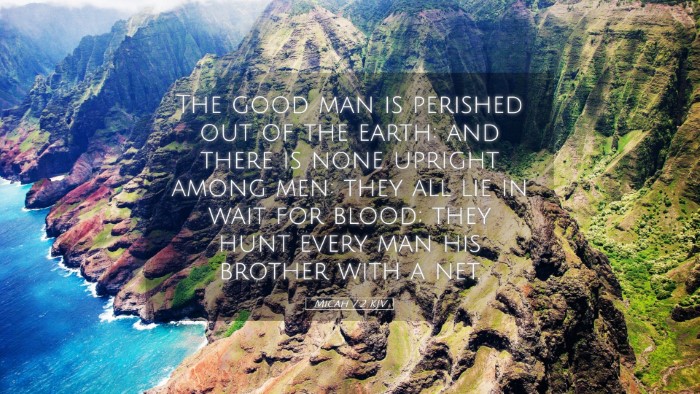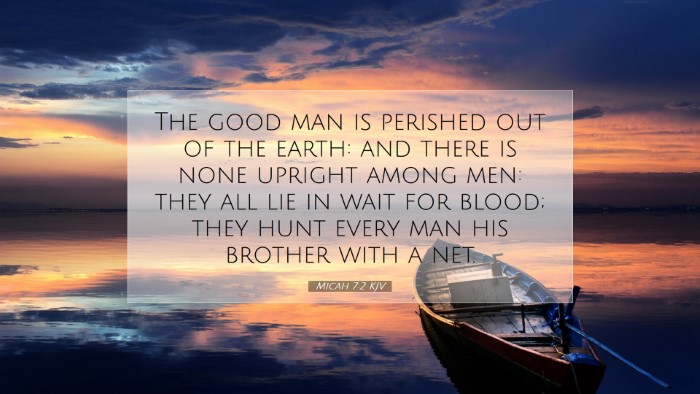Old Testament
Genesis Exodus Leviticus Numbers Deuteronomy Joshua Judges Ruth 1 Samuel 2 Samuel 1 Kings 2 Kings 1 Chronicles 2 Chronicles Ezra Nehemiah Esther Job Psalms Proverbs Ecclesiastes Song of Solomon Isaiah Jeremiah Lamentations Ezekiel Daniel Hosea Joel Amos Obadiah Jonah Micah Nahum Habakkuk Zephaniah Haggai Zechariah MalachiMicah 7:2
Micah 7:2 KJV
The good man is perished out of the earth: and there is none upright among men: they all lie in wait for blood; they hunt every man his brother with a net.
Micah 7:2 Bible Commentary
Commentary on Micah 7:2
Bible Verse: "The good man is perished out of the earth: and there is none upright among men: they all lie in wait for blood; they hunt every man his brother with a net."
Introduction
This verse from Micah speaks to the somber reality of moral decline in society. It reflects the prophet's lament for the loss of righteousness and integrity among the people of Israel during a time of political and social tumult. Drawing from the wisdom of public domain commentaries, we will explore the layers of meaning behind this profound statement.
Contextual Background
Micah prophesied during a turbulent time in the history of Israel, marked by social injustice and widespread idolatry. As the nation faced impending judgment from God due to its sins, Micah stood as a voice of lamentation, articulating the spiritual and moral decay he observed.
Micah’s Audience
His message was directed primarily at the leaders and the common people of Judah, who had turned away from God's laws. This context is crucial for understanding the depth of his sorrow expressed in Micah 7:2.
Exegesis of Micah 7:2
In this verse, the prophet laments the absence of righteous and faithful individuals among the people. The key components of the verse highlight both the gravity of the situation and the sociological implications of such moral failure.
The Good Man Perished
Matthew Henry emphasizes that the phrase "the good man is perished" signifies a profound loss, illustrating that the virtuous person has become a rarity. His absence creates a vacuum of integrity and morality in the community.
- Spiritual Vacuum: Henry points out that when righteous people are absent, darkness envelops the land.
- Consequences of Corruption: The theological implications suggest that the community suffers not merely from the absence of a good man, but from the collective consequences of sin.
None Upright Among Men
Albert Barnes delves into the idea of uprightness, indicating that the term refers to moral integrity and adherence to God's laws. The absence of righteous individuals underscores severe moral decay.
- Cultural Reflection: Barnes suggests that the condition of society reflects the abandonment of divine principles, which leads to injustice.
- Universal Decline: The lack of upright men indicates a widespread malaise affecting all levels of society, calling into question the very foundations of communal righteousness.
Lie in Wait for Blood
This phrase captures the treachery and hostility that characterized the relationships among the people. Adam Clarke interprets this as a metaphor for betrayal and violence that permeates society.
- Social Dynamics: Clarke notes that the metaphor highlights how individuals resort to deceit and violence against one another for personal gain.
- Divine Justice: This behavior ultimately calls attention to the inevitable divine justice that must come to bear upon such actions.
Theological Implications
The verse serves as a powerful reminder of the need for spiritual vigilance and moral integrity. It prompts reflection on the nature of righteousness and the communal responsibility to uphold God’s standards.
Call for Repentance
The lamentation captured in Micah 7:2 underscores the urgent need for repentance amongst God’s people. It drives home the point that societal revival begins with individual integrity.
Hope Amidst Despair
While the tone is somber, it is critical to note that prophetic lamentation often carries with it the seed of hope for restoration. Micah’s message is not merely one of despair, but also points forward to God’s redemptive plans for His people.
- Future Restoration: Even amidst the darkness, the promise of God's restoring grace remains a cornerstone of prophetic literature.
- Vocation of Righteousness: The call for uprightness serves as a reminder of the high calling that God has placed upon His people, encouraging them to strive for holiness.
Conclusion
Micah 7:2 is a poignant reflection on the state of humanity in rebellion against God. It serves as a timeless reminder to pastors, students, theologians, and Bible scholars of the continual need for righteousness within the body of Christ. The insights gleaned from the commentaries not only enhance our understanding of Micah’s message but also challenge us to lead lives that reflect God’s character in a world that often resembles the darkness Micah lamented.


